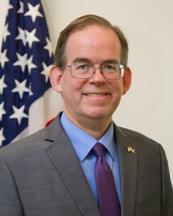U.S. Chargé d’affaires David J. Young’s Speech at the MSMEs Clinics in Abuja at the Eagle Square. 20th July 2017
I stand on existing protocol and thank all of you for hosting us here today as we attend this “Care Clinic” for micro, small, and medium-sized enterprises in Nigeria.
As you may know, the U.S. government places a high priority on support to entrepreneurship and business development. In our country, small and medium enterprises are the lifeblood of the economy.

In the United States, micro, small, and medium-sized enterprises comprise 99.7 percent of all businesses, employ 48 percent of the work force, and create over one (1) million jobs annually. Of particular note for many in this audience, small businesses generate over one-third of the value of all U.S. exports. Clearly, small and medium enterprises play a critical role in driving the U.S. economy.
Nigeria is no different: MSMEs comprise over 99 percent of the businesses here. Through my travels across this country, I have seen the vibrancy of micro, small, and medium enterprises across many sectors of the economy, and the entrepreneurs who make them reality.
One such entrepreneur is Onyekachi Ekezie, the chief executive of Kaptain Foods. Born in Nigeria, “Kachi’ studied computer science in the United States for fifteen years with the idea of working in the oil and gas sector. But after he returned home, his eye turned to the fast moving consumer goods sector and he went in a completely different and more independent direction.
Working in the kitchen of his two-bedroom apartment in Lagos, Kachi developed the recipe for a new tomato sauce. With a little help from USAID to develop a business plan and connect him with export markets, his sauce is available in dozens of stores around Lagos and is exported to Ghana and other countries in the West African region. Kachi’s inspiration, hard work, and ability to capitalize on the opportunities found only in Nigeria that has made his business a success.

I am not alone in this assessment of the opportunity Nigeria affords to small business. When Mark Zuckerberg, the CEO of Facebook, came to Lagos last year, he was impressed with some of the leading Nigerian information technology firms, most of which were small enterprises. Former Secretary of State John Kerry visited Sokoto and expressed similar praise after we introduced him to several micro-enterprises in the agricultural sector.
Indeed, the United States and Nigeria share the high regard in which we hold the importance of vibrant small and medium enterprises among business and political leaders. Through his Foundation, the Nigerian businessman Tony Elumelu has focused on training and sponsoring young entrepreneurs, not just in Nigeria, but throughout Africa.
When Acting President Osinbajo visited an exhibition of small and medium enterprises last year in Abuja, he spent over an hour and a half visiting and meeting business owners, a testament to the importance he places on this critical sector of the economy.

So we congratulate the Government of Nigeria for hosting this small and medium enterprise Care Clinic, which will help business owners to resolve various issues in real time, and to help government agencies address the regulatory bottlenecks that small businesses often encounter. The resolve is here, the businesses are here, and as all of you know, the factors of production are here in abundance. What is missing is a better business-enabling environment where small and medium businesses can operate freely in a supportive atmosphere.
In support of this endeavor, the U.S. government has partnered with the Government of Nigeria in areas such as improving availability and affordability of power; introducing trade and business regulations in line with global standards; and improving governance at the federal, state, and local levels.
As Nigeria begins to grow out of recession, working with government to build a solid foundation for broad-based economic growth will help businesses realize their full potential.
























Leave a comment